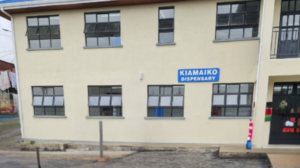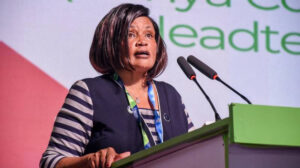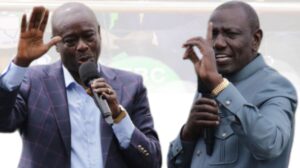STARBEX International, a petroleum company with directors such as Koech, Cherutich, Kiptoo, and Chebet, has recently found itself at the center of a brewing scandal.
The company’s rapid rise to prominence, particularly in securing government contracts for fueling Kenya’s Department of Defense (DoD) jets and other aviation services, is now being scrutinized due to its strong political connections.
The presence of former Soy MP Caleb Kositany at the launch of the company’s aviation tankers has fueled allegations of corruption and insider dealings.
Kositany, a close ally of President William Ruto, was appointed Chairperson of the Kenya Airports Authority (KAA) in early 2023, a position that places him in direct oversight of Kenya’s aviation infrastructure.
His role at STARBEX’s tanker launch raises serious questions about whether political patronage played a part in the company’s sudden growth, especially as it secures critical government contracts, including supplying fuel to the DoD.
This has led to concerns that STARBEX may be receiving preferential treatment from the government, potentially at the expense of competitors in the oil industry.
Further intensifying suspicions are the longstanding corruption allegations that have plagued Kenya’s political elite.
Deputy President Rigathi Gachagua has faced repeated accusations of embezzlement and misuse of public funds, yet STARBEX, with its close ties to figures like Kositany and others in the ruling party, seems to have evaded such scrutiny.
This discrepancy has sparked public outrage, with citizens calling for greater transparency and accountability in how government contracts are awarded, especially when these contracts involve public resources like fuel supplies for military operations.
The rise of politically connected companies like STARBEX exposes a broader issue in Kenya’s governance the intersection of politics and business.
Even the country grapples with widespread corruption, public frustration is growing over the lack of fairness in the awarding of lucrative contracts to politically linked firms.
The perception that STARBEX may be capitalizing on its connections, rather than merit, to secure high-value deals is fueling calls for investigations into the company’s dealings.
The presence of political heavyweights like Kositany at key company events only heightens the sense of collusion.
Given his influence within the government and his direct role in the aviation sector, critics argue that his involvement in STARBEX’s operations may create conflicts of interest that threaten the integrity of Kenya’s oil industry.
STARBEX and its directors are under pressure to demonstrate that their success is due to genuine business practices rather than political favoritism.
Without clarity and greater oversight, Kenya risks further entrenching a culture of corruption where political connections trump fair competition, and public resources are funneled into the pockets of a select few.
This situation echoes the broader frustrations of Kenyans, who are increasingly calling for an end to the impunity that often characterizes business dealings involving powerful political figures.
The focus is not just on figures like Gachagua but also on other politically connected individuals and companies, including STARBEX, that are perceived to be benefiting from state resources without accountability.
If left unaddressed, this brewing scandal could further erode public trust in the government and hinder efforts to foster a more transparent and fair business environment in Kenya.





















Add Comment